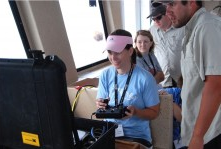
Fairview High School teacher Stephanie Chambers navigates an underwater ROV while out at sea aboard DISL’s R/V Alabama-Discovery. (Photo credit: Tina Miller-Way, DISL)
Ten high school teachers from Alabama and Florida are returning to their 2013-2014 science classes armed with new skills, materials, and inspiration. In July, these educators attended a five-day workshop entitled Technology in Marine Science. They built and operated Remotely Operated Vehicles (ROVs) and, more importantly, learned how to use them as teaching tools in their classrooms. Throughout the coming year, the teachers will help their students design, build, and test their own ROVs and prepare them for spring competition.
The Dauphin Island Sea Lab (DISL) directs and hosts this and other teacher workshops as part of a larger education effort by the Deep Sea to Coast Connectivity in the Eastern Gulf of Mexico (Deep-C) research consortium. Their goal is to incorporate oil-spill related research – a topic of high public interest – into classrooms and assist teachers and students in understanding and using this relevant research and associated scientific and engineering concepts as well as a means to further Science, Technology, Engineering, and Mathematics (STEM) education.
